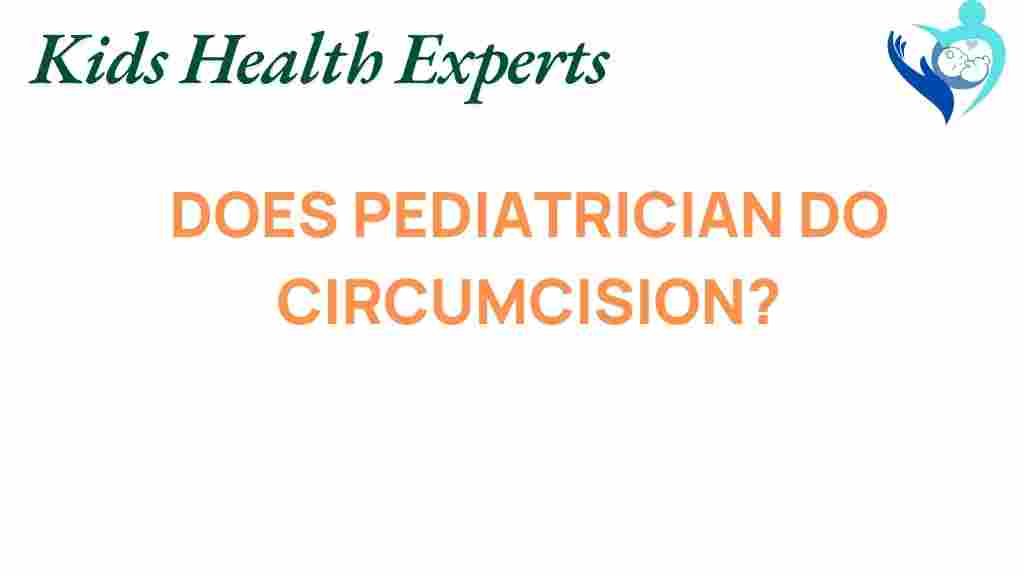The Controversial Role of Pediatricians in Circumcision Decisions
The decision to circumcise a newborn is a topic that stirs considerable debate among parents, medical practitioners, and ethicists. Pediatricians play a pivotal role in this decision-making process, often providing guidance and insight based on medical practices, health ethics, and the latest research. This article explores the complex dynamics involved when pediatricians assist parents in making circumcision decisions, emphasizing the importance of informed choices in child care and infant health.
Understanding Circumcision
Circumcision is the surgical removal of the foreskin from the penis, which is performed on newborns and sometimes older children or adults for various reasons. The motivations for circumcision can be categorized into:
- Religious beliefs: Many cultures and religions, such as Judaism and Islam, mandate circumcision as a rite of passage.
- Health benefits: Some parents and pediatricians argue that circumcision can reduce the risk of urinary tract infections, sexually transmitted infections, and penile cancer.
- Hygiene: Some parents believe that circumcision makes it easier to maintain hygiene.
Despite these reasons, the decision remains highly personal and can vary significantly across different cultures and families.
The Role of Pediatricians in Decision-Making
Pediatricians are often the first point of contact for parents when considering circumcision. Their role primarily involves providing evidence-based information, addressing parental concerns, and guiding them through the decision-making process. Here’s how they typically approach the topic:
- Providing Information: Pediatricians must present both the potential benefits and risks of circumcision. They should discuss complications such as bleeding, infection, and the need for revision surgeries.
- Health Ethics Considerations: Pediatricians must navigate the ethical implications of recommending a procedure that is not medically necessary. The principle of non-maleficence—”do no harm”—is paramount in health ethics.
- Respecting Parental Guidance: Ultimately, the decision rests with the parents. Pediatricians should respect their values and beliefs while ensuring they are well-informed.
Steps in the Decision-Making Process
When parents approach pediatricians with questions about circumcision, the following step-by-step process can help facilitate an informed decision:
- Initial Consultation: Parents should schedule an appointment to discuss their concerns and questions about circumcision with their pediatrician.
- Education: The pediatrician should provide educational materials that outline the pros and cons of circumcision, including potential health benefits and risks.
- Discuss Personal Beliefs: Parents should share their cultural, religious, and personal beliefs regarding circumcision. This discussion can help pediatricians tailor their recommendations.
- Consider Alternatives: Pediatricians may suggest alternatives to circumcision, such as proper hygiene practices and education about the natural anatomy.
- Make an Informed Decision: After thorough discussions, parents should feel empowered to make a decision that aligns with their values and beliefs.
- Follow-Up: Regardless of the decision, the pediatrician should schedule follow-up visits to ensure the child’s health and address any further questions.
Addressing Common Concerns
Many parents have specific concerns regarding circumcision that pediatricians can help address:
- Potential Complications: Pediatricians can explain the low incidence of complications associated with circumcision and what to watch for post-procedure.
- Pain Management: Discussing pain management options during and after the procedure can alleviate parental fears regarding infant discomfort.
- Long-Term Health Implications: Pediatricians should outline both short-term and long-term health implications related to both circumcised and uncircumcised infants.
Health Ethics in Pediatric Practice
Health ethics is a critical aspect of pediatric practices, especially concerning circumcision. Pediatricians must adhere to ethical guidelines that prioritize the child’s best interests while respecting parental autonomy. Key ethical considerations include:
- Informed Consent: Parents must provide informed consent, which means they understand the procedure, its risks, and benefits.
- Child’s Rights: Pediatricians must consider the child’s rights and well-being, advocating for what is best for the child in the long term.
- Professional Integrity: Pediatricians should avoid conflicts of interest and remain unbiased in their recommendations.
For more in-depth discussions on health ethics, consider visiting reputable sources such as the American Academy of Pediatrics.
Parental Guidance in Circumcision Decisions
Parental guidance is crucial in making circumcision decisions. Pediatricians should encourage parents to engage in open discussions and research. Here are some tips for parents:
- Seek Multiple Opinions: Parents should feel free to consult multiple pediatricians or healthcare professionals to gather diverse perspectives.
- Educate Themselves: Reading reputable sources, such as medical journals and guidelines from professional organizations, can help parents make informed choices.
- Consider Future Implications: Discussing how the decision might impact the child in the future can provide valuable insights.
Troubleshooting Common Issues
Parents may encounter several issues during the decision-making process regarding circumcision. Here are some common scenarios and how to address them:
- Conflicting Opinions: If parents receive conflicting opinions from different healthcare providers, they should ask for clarification and evidence supporting each viewpoint.
- Emotional Stress: The emotional weight of the decision can be overwhelming. Parents should seek support from family, friends, or support groups.
- Cultural Pressures: Cultural expectations can influence decisions. Parents should evaluate these pressures against their values and beliefs.
Conclusion
The role of pediatricians in circumcision decisions is critical, balancing medical advice, health ethics, and parental guidance. As the gatekeepers of infant health, pediatricians must provide comprehensive information, advocate for the child’s best interests, and respect parental autonomy. By fostering open communication and informed decision-making, pediatricians can help parents navigate the complexities of circumcision, ensuring that the choices made are in the best interest of the child.
For parents grappling with this decision, it is vital to engage in discussions with healthcare professionals, educate themselves on the topic, and consider all aspects of their child’s health and well-being. Ultimately, the decision to circumcise is deeply personal and should reflect the family’s values, beliefs, and understanding of the medical implications. For further information on child care and health practices, you can visit this resource.
This article is in the category Care and created by KidsHealthExperts Team

1 thought on “The Controversial Role of Pediatricians in Circumcision Decisions”